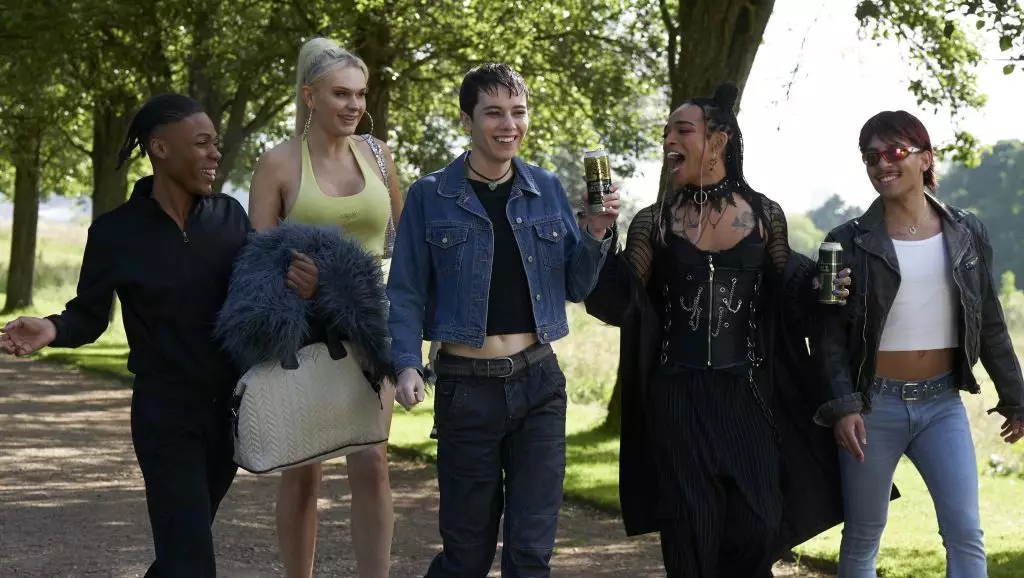The anticipation surrounding “What It Feels Like For A Girl,” an eight-part series adapted from the poignant memoir of transgender advocate Paris Lees, showcases an evolution in storytelling that goes beyond mere entertainment. Set to premiere on BBC3 and iPlayer later this year, this series aims to capture the essence of youthful exploration, identity, and the unfiltered chaos of growing up in a tumultuous time. With a diverse and talented cast led by Ellis Howard, the project has already drawn attention for its compelling premise that delves into the complexities of gender and identity within an exhilarating backdrop.
A Striking Lead Performance
Ellis Howard takes on the pivotal role of Byron, a working-class youth longing to break free from the confines of his small-town existence. As he embarks on a journey to Nottingham, he encounters not only the intoxicating allure of the noughties club scene but also a profound transformation that challenges societal perceptions of gender and self-identity. Paris Lees’ specific insight when selecting Howard reveals the expectations of authenticity that underlie this production. “A cheekiness, a delicateness, a complexity,” are traits that made Howard the ideal choice, emblematic of the personal battles faced by many in the LGBTQ+ community during their formative years.
Supporting Cast and Their Role in Storytelling
The richness of the narrative is further enhanced by an impressive ensemble cast, including notable names like Hannah Walters and Laura Haddock, who contribute depth and nuance to the story. Each character Byron encounters becomes a mirror reflecting the struggles, camaraderie, and rivalries that are intrinsic to the human experience.
Particularly intriguing is the dynamic between Byron and Sasha, played by Hannah Jones. This relationship adds layers to the storyline, encompassing both friendship and rivalry. It emphasizes that the journey of self-discovery often involves complicated interpersonal relationships that can amplify feelings of alienation or belonging. Such complexities will resonate deeply with viewers who may have experienced similar growth and conflict.
The Heart of the Noughties Club Scene
“What It Feels Like For A Girl” positions itself at an intersection of nostalgia and contemporary relevance. The early 2000s, characterized by an exuberant nightlife and a burgeoning acceptance of diverse identities, serves as a fitting canvas for Byron’s story. The series promises to encapsulate this chaotic era’s attributes, offering escapism through the lens of gritty realism. The underbelly of the night scene—the pursuit of thrill, camaraderie, and sometimes peril—invites audiences to confront their own experiences within the realm of youth and revelry.
However, it is essential to acknowledge that while stories of personal emancipation are crucial, they often gloss over the darker undertones of hedonism. Reflecting on the tagline “The party can’t last forever,” the series foreshadows moments that shatter this illusion, hinting at themes of consequence, sacrifice, and the search for identity amid chaos.
A Collaborative Creation
The collaboration between Paris Lees and a diverse writing team, including Georgia Christou and Paul Williams, suggests a commitment to authenticity and a nuanced portrayal of the experiences depicted. By including voices from various backgrounds, the writers aim to enrich the narrative, allowing it to transcend stereotypes while providing a heartfelt exploration of identity and belonging.
Directed by Brian Welsh, alongside contemporaries like Ng Choon Ping, the series boasts a capable direction that blends visual artistry with emotional storytelling. This synergy is vital in a narrative that seeks to weave together potent themes of transformation and acceptance.
A New Era of Representation
The adaptation of Paris Lees’ memoir signifies a vital shift in representation on screen. It opens doors not just for gender-diverse narratives but for the stories of those searching for their identities in a world that often feels hostile or indifferent. By centering narratives that challenge traditional norms, “What It Feels Like For A Girl” is positioned to be a vital voice in a landscape that demands more stories of authenticity, resilience, and celebration of individual experiences, particularly for marginalized communities.
As the release date approaches, the series is more than just an adaptation; it represents a call for deeper conversations about identity, belonging, and the rich tapestry of human experience woven through the revelatory lens of youth.


Leave a Reply